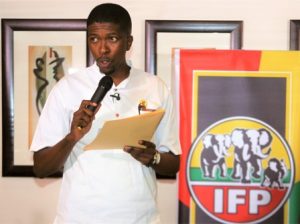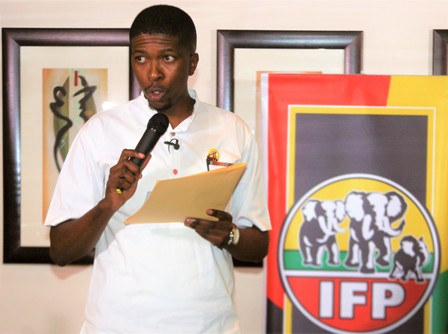
“Bua!” someone at a nearby table voiced their approval in SeSotho amidst a gathering of people who not only mainly carried Nguni names – but also are mostly Zulu speakers.
“The fact that KwaZulu-Natal is our biggest support base does not mean that we are just for Zulus.
Such a notion is propaganda to fuel tribal and racial tensions”, Hlengwa asserted.
Conscious of recent history, the irony was palpable, just as well and truly appears that the traditional organization have since moved with the times from the moment back in 1977 when Prince Mangosuthu Buthelezi, had been summoned to Pretoria just two years after Inkatha’s formation, and apparently tried to bully him into limiting his party to Zulu members only, by the apartheid States’ then Minister of Police and Justice, Jimmy Kruger – he of the infamous, “Dit lat my koud” [it leaves me cold] quip, on the occasion of Stephen Bantu Biko’s death whilst in custody.
The former Chief Minister of the KwaZulu Bantustan went on to retort that as long as the National Party received whites of all ethnic groups, he had the same right to receive Africans of all ethnic groups.
On a slightly chilly winter evening, the voice which had bellowed in another vernacular other than Zulu, was in warm, thanks to the various overhead heaters, space occupied by clearly the sort of sophisticates who there and then eradicated the notion of its party as mainly rural-based and with rank and file who’d the sooner be seen in amabeshu [traditional gear] than city slicker, tailored suits.
This particular gathering attracted a fair smattering of party big hitters. Within the walls of the venue on the famous Vilakazi street were the likes of Helen Makhubo [MMC of Transport in the City of Johannesburg] and Mzobanzi Ntuli [MMC of Housing in the City of Johannesburg] – among others too numerous to mention.
The purpose of the rendezvous, it was stated, was to meet with professionals with the view of breaking down what the IFP is all about and to the extent that it can offer an alternative to economic policies as espoused by rivals such as the EFF and the ANC.
Offered the occasion’s keynote speaker and the party’s Youth Brigade National Chairperson- MP Mkhuleko Hlengwa, that he was there to interact in a healthy discussion with fellow young South Africans on the vision of the IFP at a critical time when the economy is in a technical recession, economic downgrades were upon us, high unemployment had become a permanent feature of our reality, escalating poverty was rapidly becoming a norm and widening inequality was entrenching itself at a fast pace.
With waitresses working the tables bearing trays laden with choice cheeses, fresh fruit and breads and others filling glasses with commendable vintages of wine – the three pillars of fine cuisine were met as listeners heard the University of the Witwatersrand graduate let slip that his party subscribed to pragmatic approaches to the country’s developmental agenda.
“South African solutions to South African problems. We simply need to do that which works for South Africa and deals directly with our collective set of challenges”, tucked in the articulate orator.
Continuing on, Hlengwa pointed out that for as long as we maintained the status quo of colonized education devoid of South African and African literature, we would forever produce a colonized intelligentsia for a democratic and free South Africa and thus fail to solve our problems.
“We must now confront the substantive issues of transformation and access in the education sector in its entirety if we are to produce the skills, knowledge, expertise and innovation needed by the type of people-centered economy and development we envisage for South Africa”.
Urging for beneficiation and enhancing of market linkages, the youth leader recalled of how back in 2005, the country was able to realize an economic growth of 5,5% – but sans creating jobs, since the focus was largely on macro-economic growth, much to the neglect of micro-economic development.
The IFP, he dropped a hint, envisaged an economic outlook where localization for national and global trade would become the modus operandi.
He further suggested the rebuilding of SMMEs and the micro-economic sector as a starting point – were the country to succeed in pushing back the frontiers of unemployment, poverty and inequality.
Hlengwa also touched on the overburdening of the middle class in addition to the fact that social grants, although a necessary intervention, are nonetheless an unsustainable intervention.
“The IFP subscribes to the twin pillars of self-help and self-reliance where in simple terms development has a particular bias towards teaching a man how to fish”, passionately implored the Member of Parliament.
Pointing to a quote that, “Eternal vigilance is the price of liberty” – he put it to the over-subscribed audience that, never before was that observation more truly for the republic.
Looking ahead, he earmarked 2019 as the moment which should serve as an opportunity to decisively change the country’s trajectory through citizenry activism.
“We need to rid ourselves of the shackles of the past and its politics of nostalgia wherein corruption and state capture thrives because election campaign rhetoric is rooted in struggle credentials and devoid of a vision for the future”, he said.
In 2019, he ventured to spirited applause, South Africa must be taken back through the barrel of the ballot.
In concluding, Hlengwa quoted his party’s principal Prince Buthelezi when, on the occasion of the organisation’s 40th Anniversary, he spoke regarding how Inkatha never deviating from principles of the 1912 founding fathers of Africa’s oldest liberation movement, the African National Native Congress – that of unity, inclusivity, passive resistance, equality, integrity, negotiations and freedom.
Therefore, claimed Hlengwa, the IFP exists today as the ANC in its original form. That, he said whilst a framed image of a smiling [once political nemesis] Madiba alongside the similarly smiling restaurant owner stared at the attendees from one of the walls, and as a Soweto TV crew filmed on.
The evening had now kicked into high gear as he wrapped up and around the tables the occupants were expressing an affirmative mood at the just dished up food for thought and as provision was made for a Q & A session whereat one of the invited guests requested further expounding on the what is White monopoly capital narrative – described as a reality and claimed to be a phase along the lines of the Ottoman Empire, in history.
A fine set who relish complementary finery in dine and wine matters, when the time came for that aspect to the occasion, the eatery didn’t disappoint as, having made light work of the earlier cheese and wine starters – the mains now beckoned in the form of grilled hake, oxtail, grilled chicken, braai wors; starch of mash, dumpling, samp and beans; veggies entailing spinach, stir-fry, butternut; salad complement of Greek salad and chakalaka.
The dessert was undoubtedly heavenly on the palate and appetised in the form of malva pudding and custard, chocolate and even more wine – with the majority preference being for the variety edging toward the crimson hue – as a matter of the imbibers unapologetic bias!
Encouraged the good-spirited program director, “Guys, we are not confined to wine alone – order whatever you want!”
Unsurprisingly, the overwhelming response befell the restaurant like an avalanche – Amandla!!!
Hot and cold beverages continued being consumed into the late evening whilst outside, sleek jalopies parked under watchful eyes of attendants.

